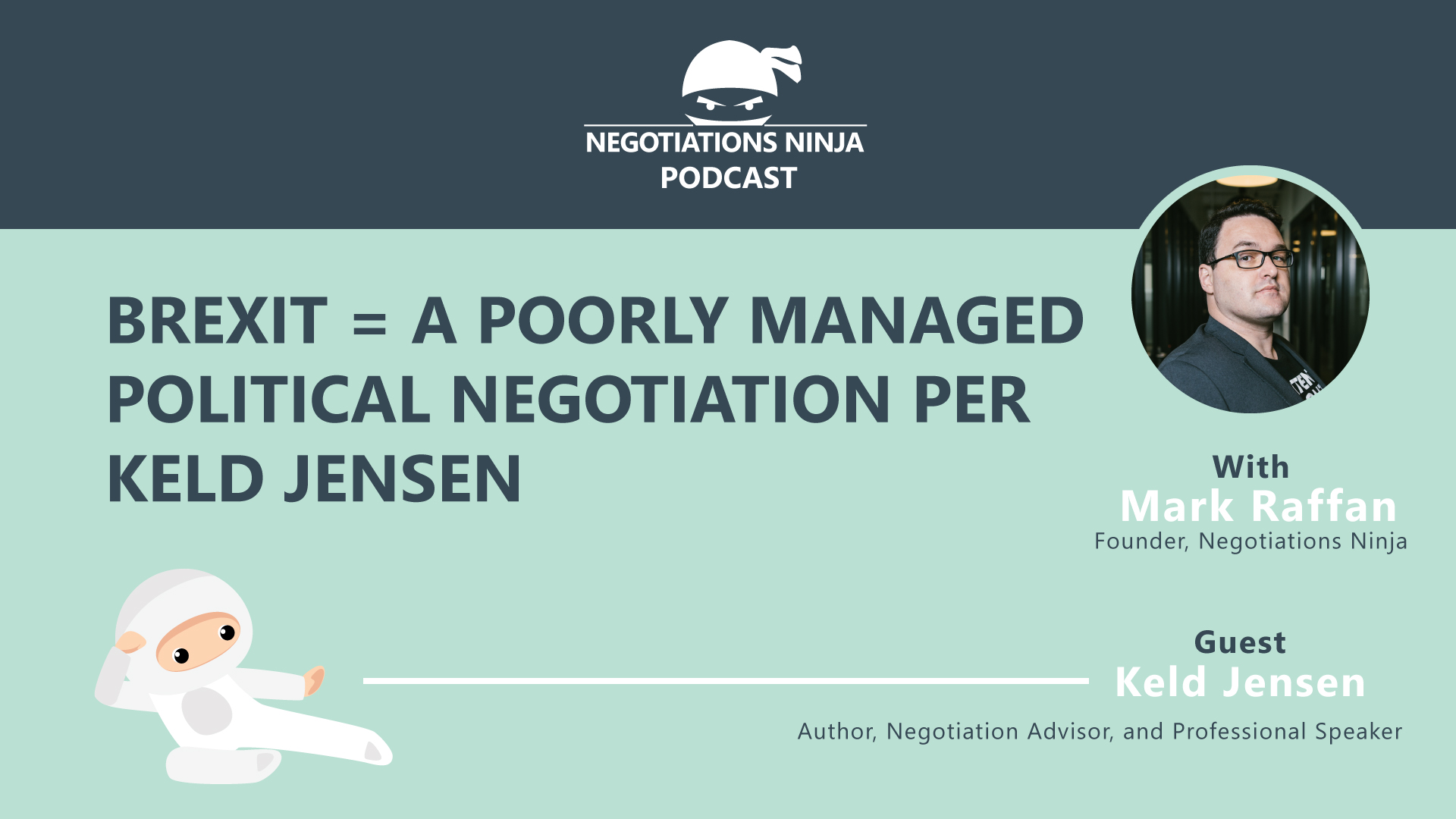I can’t say “Brexit” without choking down laughter. But many people are passionate about Brexit, and I don’t mean to make light of it. But what’s amusing from an outside perspective? How would Brexit have been negotiated better? Keld Jensen returns to the Negotiations Ninja podcast to apply his expertise to another contract negotiation that would have benefitted from his input.
Outline of This Episode
- [2:42] Was Brexit an amazing deal?
- [4:54] What was negotiated well?
- [7:03] Political negotiation vs. business negotiation
- [8:26] Mistake #1: The wrong people at the table
- [10:34] Mistake #2: Too many cooks in the kitchen
- [13:22] Mistake #3: No concrete negotiation strategy
- [17:21] What can other countries learn from this?
- [19:42] How to apply this to the business landscape
- [21:58] Ask the counterparty questions—then listen
- [23:52] Life or Death listening by Dan Oblinger
Brexit goes beyond time mismanagement
The UK said that Brexit was achieved in record time and that it was an amazing deal. Is that statement accurate? Keld had a meeting with a former client who has been and is a high-ranking officer in different organizations. He was touting that Brexit was a political success, that the agreement was reached in no time, and that politicians handled the negotiation well.
Keld’s response was, “Are you kidding me?!” This negotiation started in 2016 with a deadline of 12/31/2020. They managed to sign a deal five minutes before midnight. He doesn’t mean to downplay the negotiation. It wasn’t an easy situation to handle. But taking four years to negotiate a deal with millions of businesses hanging in the balance is not responsible at all.
When you negotiate something this important where you’re talking about long-term relationships and collaboration, you have to do it better than what we witnessed.
What was negotiated well?
Well, they did reach an agreement. It can be argued that—to a certain degree—sometimes it’s better to walk away without a contract. But a professor at Stanford recently stated that even discussing not reaching a deal is ridiculous. Everyone would lose. There would be no trade agreement or ability to do business with each other. Being quoted in the media saying that there was a possibility no deal would happen was a poor move.
But was it a ploy to place pressure on the counterparty? Perhaps. But Keld is a firm believer that you should avoid negotiating in the media. If you’re sitting in a negotiation that has the interest of the public, it’s never a great idea. Sure, you could say that political negotiations are different. But why? You’re still trying to create the best possible negotiated deal, right? You’re not doing that by bluffing, sending out smoke screens, holding back information, and creating distrust.
Keld honestly believes both parties knew that they had to reach an agreement. But threatening in the media that they might not wasn’t supporting the relationship at all.
Political negotiation vs. business negotiation
Political negotiations are often influenced by the desire to get reelected. If the politician is making claims in the media, it’s for the intent to strengthen his or her position with their constituents. They’re betting that their constituents won’t do the work, research, etc., to determine if a good deal was made.
Keld jokes that they could also be claiming that an agreement can’t be made and that the process is extremely difficult, so they can look good when they come out on the other side with an agreement in place. The whole thing seems counterproductive, does it not?
Keld believes that the negotiators involved in Brexit made three crucial mistakes. What were they? What should have been done differently? What can negotiators learn from the process? Listen to find out!
Resources & People Mentioned
- Life or Death Listening by Dan Oblinger
- The Trust Factor: Negotiating in SMARTnership by Keld Jensen
- Honest Negotiation by Keld Jensen
- Episode #199 with Mihai Isman
Connect with Keld Jensen
- Keld’s Website
- Connect on LinkedIn
- Keld’s YouTube Channel
Connect With Mark
- Follow Negotiations Ninja on Twitter: @NegotiationPod
- Connect with Mark on LinkedIn
- Follow Negotiations Ninja on LinkedIn
- Connect on Instagram: @NegotiationPod




